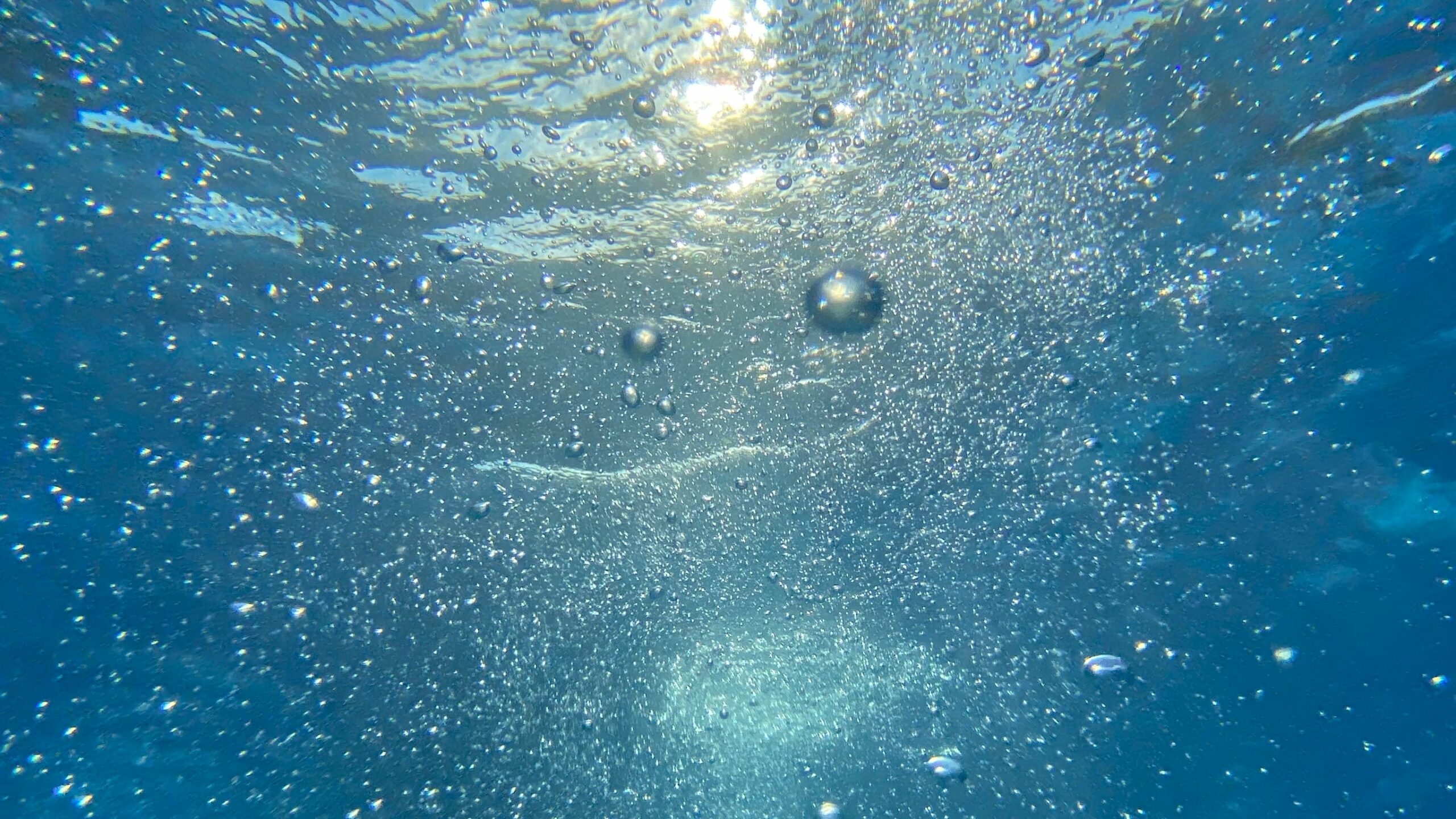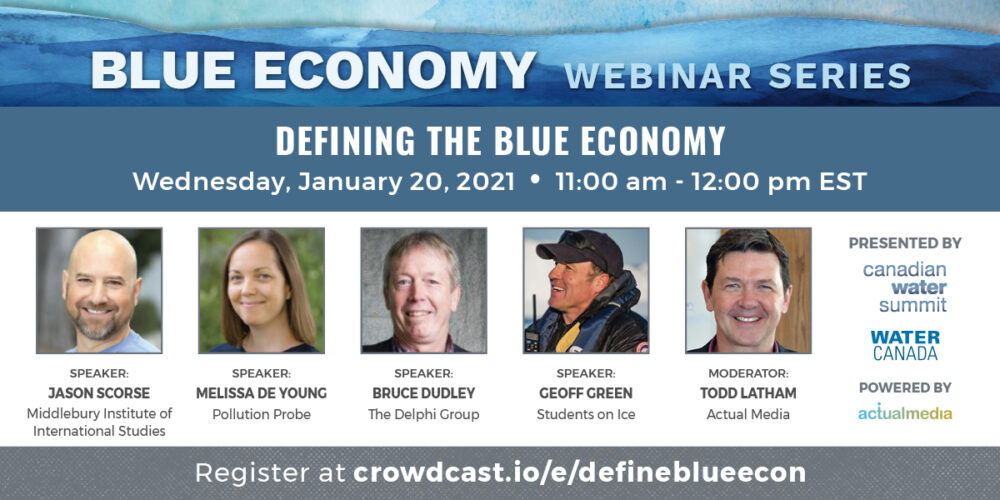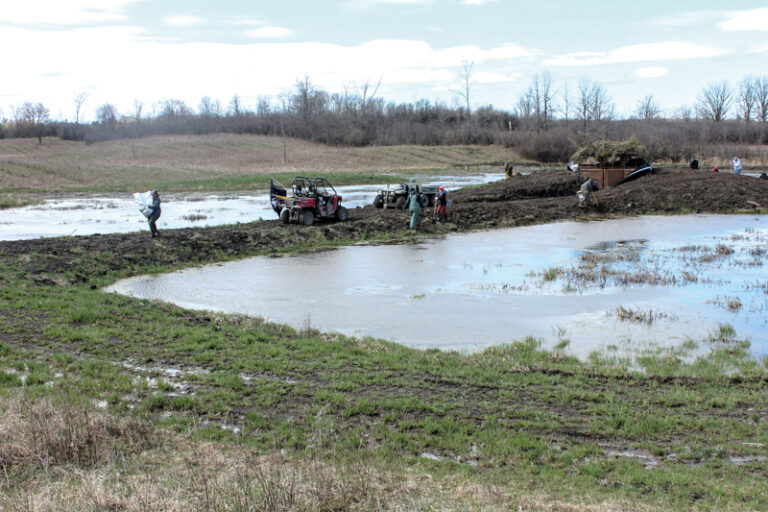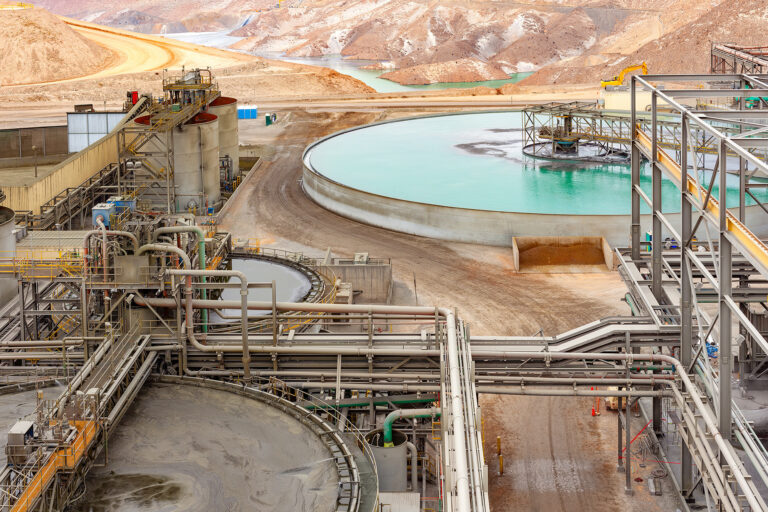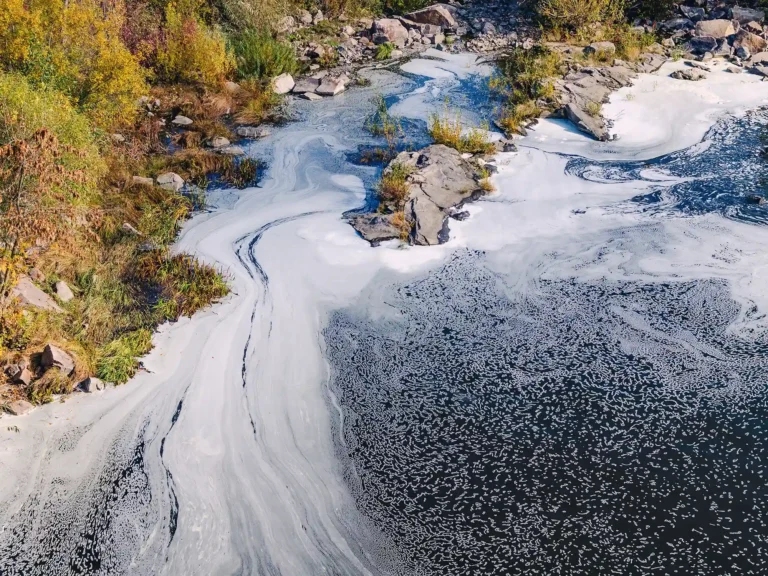Currently, predominant definitions of the term Blue Economy are synonymous with ocean resources. For example, the World Bank defines the Blue Economy as the “sustainable use of ocean resources for economic growth, improved livelihoods and jobs, and ocean ecosystem health.” Our team at Water Canada believes that this definition of the Blue Economy is too narrow and that it needs to be expanded to encompass the broader water sector.
In January 2021, Water Canada hosted a virtual discussion on why the wider definition of the term Blue Economy is warranted and why it’s important for the future of the water sector. Actual Media’s Todd Latham was joined by Melissa De Young from Pollution Probe, Bruce Dudley from The Delphi Group, Geoff Green from Students on Ice, and Jason Scorse from the Middlebury Institute of International Studies.
Setting the stage
Latham kicked off the Defining the Blue Economy webinar by setting the stage for the discussion. He noted that the term should encompass more than ocean and marine ecosystems. It should also include groundwater, drinking water treatment, rainwater, flooding, conveyance, and wastewater management.
As part of this expanded definition, there are two key considerations. The first is the idea that stewardship, which includes protecting water bodies and using water in a way that balances needs with availability, is an important part of the Blue Economy. Stewardship also includes minimizing the impact of human activities on water resources by treating wastewater before it gets into the environment, as well as reducing plastic pollution from runoff.
Economic activities are also a key consideration as a part of the expanded definition. This consideration includes identifying and supporting the sustainable development of business sectors that depend on water like fisheries, tourism, beverage, and mining.
What should the term “Blue Economy” include?
During the Defining the Blue Economy webinar, each of the speakers provided an overview of what the term Blue Economy means to them and what they think it should encompass.
“When I look at the Blue Economy, I definitely see a holistic vision of what that means,” said Green. “Not just oceans but also groundwater, drinking water, wastewater, marine protected areas, technology, science, and education. All of these provide job opportunities and career opportunities.”
“If we play our cards right—not just with the definition but [also] in the way that the Blue Economy gets communicated to people—there’s a huge opportunity in ahead of us,” noted Green. “It provides a way to bridge environmental and economic pressures and Canada should be a leader in that.”
De Young agreed with notion that the definition of the term Blue Economy needs to be expanded.
“When we’re talking about what the definition of the Blue Economy means to us at Pollution Probe, I echo the sentiments of Geoff and of Bruce in terms of broadening the definition to include freshwater,” said De Young. “It’s clearly important from some of the work we’re doing. We’ve long been advocating for ensuring that similar attention is given to freshwater environmental issues as that’s been given to ocean and marine environments.”
“A recent example was our work related to plastic pollution,” noted De Young. “Researchers in the Great Lakes have been finding concentrations, for example, of microplastics that in some cases are greater than those that are found in ocean jars. Our inland water and lakes are also critical pathways for plastic pollution reaching the oceans.”
Dudley added that he believes we’re in the very early days for the Blue Economy.
“You can look at it from a number of different lenses,” said Dudley. “One of them is the investment lens. If you look at the green bond, for example, which is a vehicle for financing projects and technologies, you have a trillion dollars for the green bonds. Compare that to a handful of small initiatives for the blue bonds. So we’re in the very early days of the Blue Economy.”
Meanwhile Scorse from the Center for the Blue Economy at the Middlebury Institute of International Studies noted that he uses the traditional definition of Blue Economy in his work. “We use the World Bank definition,” he said. “We are pretty focused on the saltwater, and ocean and coastal systems. We work internationally and we work with a lot of people in leading Blue Economy work. That seems to be pretty much where most of the world is at this point.”
Scorse added some caveats as well. He indicated that “in the U.S. national statistics on ocean and coastal economies, which we have a pretty central role in producing, we actually do include the Great Lakes as part of the Blue Economy given their magnitude, the fact that they’re used for navigation, and because they’re such massive bodies of water.”
Scorse also noted that while he is not using the expanded definition, he could “be persuaded in certain contexts that it could be expanded.” For now, he indicated that the current definition of Blue Economy is the right frame for the Centre’s work and priorities.
There were a couple of key takeaways from the discussion about what the term Blue Economy should include. The first is that including freshwater in the definition of blue economy would be in line with what some organizations have been advocating for. The second is that the Great Lakes should be included in the definition of the Blue Economy because of the importance they hold in the Canadian and U.S. contexts.
What should the term Blue Economy not include?
During the webinar, some points were raised about how the term “sustainability” fits within the Blue Economy.
Latham indicated that he has “a visceral reaction to the word sustainable. It’s not a very good word for what we’re trying to do. By definition alone, it means keep doing the same thing and that’s not what we have to do here. We can no longer be doing the same thing.”
Scorse also had some strong feelings about how sustainability fits within the Blue Economy.
“We really believe that sustainability is built into the Blue Economy,” said Scorse. “That if something has a clear unsustainable dimension, it is not a blue economic element. So we think it’s redundant to say sustainable Blue Economy.”
“One thing I’m working on and our centre is working on is building that sustainability into that definition and then using it operationally to differentiate unsustainable from sustainable,” added Scorse. “This is not something that’s been fully agreed on and there isn’t consensus on it but within my Centre, I’m pretty clear that offshore oil and gas is not the Blue Economy because it is not sustainable. It is a big source of marine pollution and obviously because of climate change, we need to get off fossil fuels.”
“Offshore wind is Blue Economy,” added Scorse. “Offshore oil and gas is not Blue Economy. I’m really much more interested in using the framework to differentiate sustainable from unsustainable activities.”
Where do we go from here?
Overall, there seems to be support for expanding the definition of Blue Economy to include more than ocean resources. Through the Keys to a Blue Economy webinar series, Water Canada aims to understand all of the key elements (e.g., infrastructure demands, technologies, etc.) that should be included in the expanded definition to support the national water sector. More information about the Keys to a Blue Economy webinar series is available here.
In the meantime, we recognize that a number of organizations are also doing important work to support the Blue Economy in different ways. For example, during the Defining the Blue Economy webinar, Dudley provided attendees a preview of GLOBE Advance’s report on Scaling Up the Blue Economy.
The report notes that “for the Blue Economy to succeed and for innovation to thrive, a diverse and varied financing approach is needed. This report summarizes the challenges and opportunities identified by experts during the Advance discussion [during GLOBE 2020] and identifies a roadmap for financing the global Blue Economy.” A copy of the Scaling Up the Blue Economy report is available here.
Over the coming months, we’ll be moving the conversation forward on what the Blue Economy should look like. Stay tuned for more details!
This article was written by Simran Chattha, the editor of Water Canada, the March/April 2021 issue of Water Canada.

